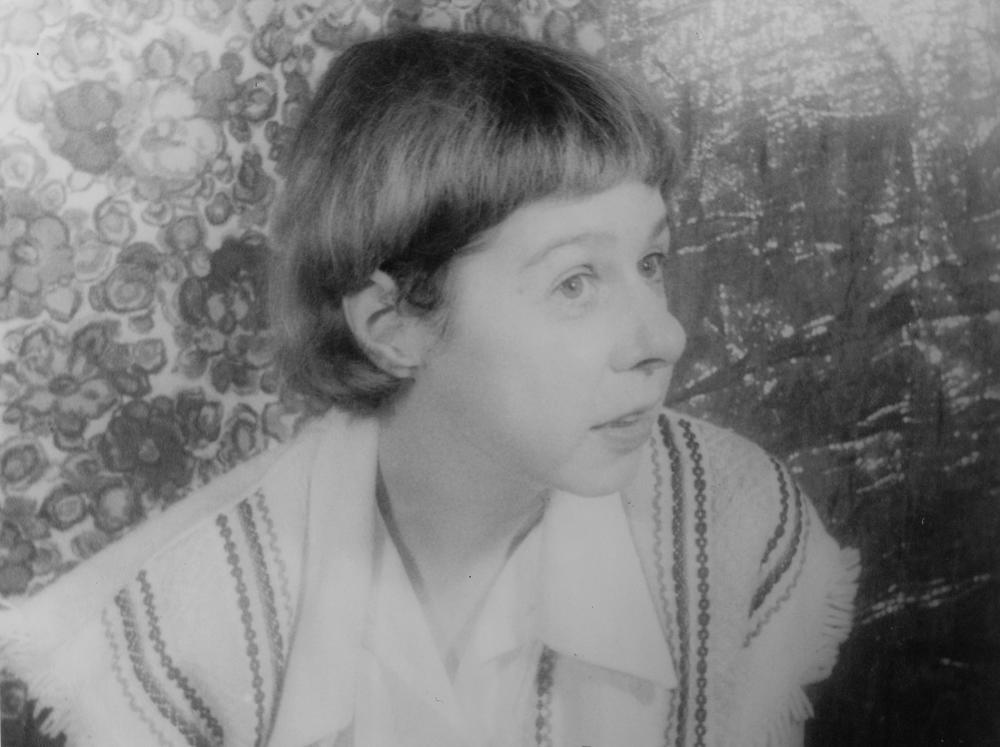
Section Branding
Header Content
Georgia Today: Jewish students respond to protests; VP Harris to visit ATL; Carson McCullers book
Primary Content
On the Friday April 26th edition of Georgia Today: Jewish students responds to campus protests over the war in Gaza; Vice President Kamala Harris makes plans to visit Atlanta next week; And we'll hear part two of my conversation with the author of a new biography of Carson McCullers.

Peter Biello: Welcome to the Georgia Today podcast from GPB News. Today is Friday, April 26th. I'm Peter Biello. On today's episode, Jewish students respond to campus protests over the war in Gaza. Vice President Kamala Harris makes plans to visit Atlanta next week. And we'll hear part two of my conversation with the author of a new biography of Carson McCullers. These stories and more are coming up on this edition of Georgia Today.
Story 1:
Peter Biello: Jewish students at colleges around Atlanta are responding to protests on their campuses over the war in Gaza, GPB's Sarah Kallis reports, a rally last night followed a clash earlier in the day between police and protesters at Emory University.
Sarah Kallis: By Thursday evening, a pro-Palestine demonstration on Emory's campus had ballooned to several hundred people. Antifa revolution. Emory University law student Avita Kessler-Godin says that she has watched every pro-Palestine demonstration this year. She wishes protesters could hear their slogans the way she and other Jewish students do.
Avita Kessler-Godin: I always ask myself if it was their sister, if it was their mother, if it was their 85 year old grandfather or nine month old baby brother taken hostage to Gaza, how would they feel? How would they feel? Would they still be chanting for the destruction of the State of Israel?
Sarah Kallis: While Kessler-Godin says that the Emery administration has made her feel safe as a Jewish student, she felt that the police force used against campus demonstrators was, quote, unnecessary. For GPB News, I'm Sarah Kallis in Atlanta.

Story 2:
Peter Biello: Vice President Kamala Harris will be visiting Atlanta once again next week. Harris is kicking off a nationwide Economic opportunity tour Monday with a series of events focused on investing in communities, building wealth and ensuring every American has the freedom to thrive. Her visit comes shortly before President Joe Biden will deliver the commencement address at Morehouse College, a speech that's been met with some resistance.
Story 3:
Peter Biello: Georgia Southern University is responding to student concerns after web pages and signs pointing people to LGBTQ supportive programs and resources were removed from campus. University officials say the online notices were removed because of a website redesign, and those signs were removed because they were out of compliance with new university system policies. Georgia Southern senior Jill King is not convinced.
Jill King: This has been a consistent issue of we're going to silence this, we're going to silence this community, but we're going to do it quietly. But I do know that students are going to keep showing up. They're not going to stop saying gay.
Peter Biello: King is one of the organizers of a sit in planned for Monday at the campuses in Statesboro and Savannah. University President Kyle Marrero says there has been no change of services offered to students.
Story 4:
Peter Biello: The Fulton County judge presiding over former President Donald Trump's Georgia election interference case will face just one challenger and his reelection bid. A DeKalb County judge yesterday upheld the disqualification of a candidate who had planned to run against Judge Scott McAfee. Attorney Tiffany Johnson was disqualified to run for the seat after she failed to appear at a hearing on a challenge to her eligibility. That leaves McAfee with a single challenger, civil rights attorney Robert Pattillo, in the Nonpartisan race to be decided on May 21st. The Fulton County district attorney prosecuting the case, Fani Willis, faces two challengers.

Story 5:
Peter Biello: Georgia's blueberry growers have voted to extend the $5 per ton assessment on marketed blueberries for three more years. The Georgia Department of Agriculture said yesterday that vote in March by more than two thirds in favor continued the assessment, which goes toward research and promotion of Georgia blueberries. The assessment was first enacted in 2008. Georgia blueberries, where $450 million crop in 2020. South Georgia's Bacon and Appling counties were the biggest producers.
Story 6:
Peter Biello: Metro Atlanta is getting $1.5 million to make the region's transportation infrastructure more resilient in extreme weather caused by climate change. The Atlanta Regional Commission's Danny Johnson says one focus of the U.S. Department of Transportation grant is roads and flooding.
Danny Johnson: We're going to get higher levels of floods, and so that puts the crossings of those rivers and streams at greater risk to our transportation network.
Peter Biello: Extreme heat also can impact rail traffic. Solutions could include road and bridge retrofitting and new design standards.
Story 6:
Peter Biello: More affordable housing is coming to Augusta. State and local officials in Augusta joined developers in a groundbreaking ceremony yesterday for a $17 million, four story apartment complex. The Lenox promises to transform a vacant property in downtown Augusta into 64 units. It's named after a former theater that once served the city's black residents and was torn down in the 1970s. Occupancy will be restricted to renters, who earn 30 to 80% of the area's median income, or up to $54,000 for a two person household.
Story 7:
Peter Biello: Seniors at a high school in southwest Atlanta have been given a series of surprises this week. GPB's Amanda Andrews explains they're all aimed at enriching the futures of graduates of Benjamin E. Mays High School.
Amanda Andrews: Atlanta Restaurant Tours Pinky Cole-Hayes, founder of Bar Vegan, says her foundation will sponsor the Mays High School Senior Prom on Saturday. Plus, upcoming graduates of Mays High School are also automatically admitted to Morris Brown College. Derrick Boazman is a Morris Brown alum and former Atlanta City Council member. He says the work university president Kevin E. James is doing is remarkable.
Derrick Boazman: I'm sure there are other college presidents saying, we should have thought of that. But the wonders of Morris Brown is that it has always been a visionary institution that look to the future while still reclaiming the glory of his past.
Amanda Andrews: The admission deal applies to the entire class of nearly 300 seniors, so long as they have above a 2.0 GPA. For GPB News, I'm Amanda Andrews.
Story 8:
Peter Biello: Governor Brian Kemp brought his bill signing tour to Brunswick yesterday, signing a package of measures related to coastal issues. House Bill 1341 declares the white shrimp George's official crustacean. Kemp signed a bill to boost the Savannah Convention Centers bonding capacity to 400 million. Another bill updating hunting and fishing regulations, and a third creating a statewide program for local development authorities to assist property owners with financing. Kemp has until May 7th to either sign or veto bills passed by the General Assembly this session, or allow them to become law without his signature.

Story 9:
Peter Biello: After her husband died, Carson McCullers found her health worsening and alcohol playing a greater role in her daily life. But she still worked, producing plays and even a novel meant to comment on racism in the changing American South. Biographer Mary V Dearborn's recent book, Carson McCullers: A Life, explores her life and legacy in the second half of our conversation. We'll talk about those parts of her life, as well as her deep need for love and attention.
Mary Dearborn: See, she was extremely needy, okay? And she's this. As you can imagine, your first impression would. Which would be correct, was of this independent, brilliant woman who's made her own way somehow. And you know, that would be right. But because of her illness and also, I think because of the way she was raised by this, an extraordinary but somewhat smothering mother, she saw herself as somebody who could do anything and yet was tremendously dependent and came to be. She had two major strokes by the time she was 30, and they really affected her really badly, and she became even physically dependent on other people. But she did have a thing. She loved touching, and she loved to use the word love. And it's true. I love the fact that she liked going to doctors because they touched her. I mean it, she was a very needy, loving. I guess I prefer the word loving but needy, dependent person. Kind of like a eternal child.
Peter Biello: One of her best friends was the playwright Tennessee Williams, and she cared a great deal about what he thought about her. And they talked quite a bit. And he said something about her in a letter that I wanted to, to bring up to you. And you quote him, in saying when you remember the poetry of her work, you feel differently about her, appreciate her isolation and her longings, and you forgive her selfishness. And that was something of an experience that I had while reading this book, like, wow, Carson McCullers seems like what what you'd call today high maintenance. Right? Like, she's she's a lot to handle and she has a lot of demands. She's a house guest that kind of doesn't know when it's time to leave. But if you know how beautiful her work is, you kind of forgive her.
Mary Dearborn: Yeah. Oh, definitely. For sure. And Tennessee, you know, they talk about as people we're close to, we should live together. You know, we should get a place together in Rome. And. And Tennessee would write to his friends saying, I really hope she doesn't take me up on that. But he also, you know, he had the sister who was, yes, I guess was schizophrenic and was had a lobotomy, and he was very close to her, and he remained close to her, and he took care of her. And Carson kind of filled that same role. And Carson would say, you know, I can't wait to meet Rose. I'm just like Rose, you know? And then in very different ways, she was there's a story that I love about Tennessee Williams, and I can't do a southern accent, so you have to just hear it in your head. Is she. He brought her for a birthday or something. A couple of lovebirds and a cage, and she, you know, enthused over them and whatever. And they had their visit and he was leaving and she said, you know, ten. Would you just take those birds, please? And and Tennessee did. And he understood. And he liked the story because it's very Carson.
Peter Biello: Yeah. Was the quote in the book I might be misremembering it too, but she said something. "Can you please take those silly birds or something like that?" The silly birds. And I'm thinking Tennessee Williams just brought her a gift. And she's saying, "let it go!"
Mary Dearborn: You have to and you have to hear that in a southern accent. But yeah, there was it was a, complicated relationship. Also, you know, Tennessee had his own immense problems. And yet they, or because of that, they really bonded. He was probably closer to her than anyone but the people she was in love with.
Peter Biello: So. Yeah. And she, he was a big presence in the last 15 years or so of her life. Yeah. Her husband died by suicide. Her l ast novel, Clock Without Hands. It seemed like she worked on that for quite a long time, through the tumult of the 50s and early 60s. And it took, an anti-racist reading, call it that at the time, but it took kind of an anti-racist point of view. What do you make of the significance of a white southern woman of her stature at the time, because her name was in demand still at that time in her career? A white woman from the South writing about race.
Mary Dearborn: That's a good question, because, it's not the best of her novels. It's quite good, but it's for various reasons. Mostly her health. Her, writing was falling off a little. Not everyone agrees with that, I should say. But, it's a very curious approach to raise. What? There's a character in there I just like this who's black and has blue eyes, and the antihero who she clearly, loved creating is a judge who wants who had been a member of Congress and wants to roll back time to the days of slavery. And his his specific plan is to reintroduce Confederate currency. Currency. And, you know, he's an awful person, and the blue eyed black guy is related to him. And it's a it's about the old selves meeting new realities. And it you know, it was a, in a way, a brave thing for her to take on.
Peter Biello: You mentioned her illnesses, her illness, which started with strep throat very early in life and wasn't treated the way it would be treated now. So it led to rheumatic fever, which led to strokes which by the end of her life progressed so that the left side of her body was was not really working and she was possibly going to have to have a leg amputee.
Mary Dearborn: Yes.
Peter Biello: So her physical abilities were really, really limited towards the end of her life and she did not look good. Her friends really know how bad she looked. And I was thinking about all this, and then also how much she drank and how doctors would say, don't drink. And she would completely ignore that advice. And I just kept thinking, you know, she's she's only 50 when she dies. And a lot of her life was consumed by bad health. Do you think about that? Like what her productivity would have been like or what more she could have written if she had just been able to kick the alcohol habit?
Mary Dearborn: Yeah. I mean, what's lost is just incredible. And I really her her writing starts falling off around age 35, you know, and it's.
Peter Biello: So young.
Mary Dearborn: Young. It really is young. So we think of what, you know, what might have been. But yeah, she compounded the problems she had with from her stroke with alcohol. I mean, it becomes a vicious circle of course, because she's in pain. She drinks that help somewhat and then that just snowballs. Unfortunately, the people around her didn't say, Carson, you know, you have to. You're drinking too much. You have to stop starting with her family, who were all heavy drinkers, except maybe her brother. But her sister, who she was very close to, was in AA. Reaves was intermittently in AA, but nobody said to her, I don't think anyone said, Carson, come to a meeting with me. You know Carson, she was a genius and you didn't want to mess with that.
Peter Biello: Well, Mary Dearborn, thank you so much for coming in and speaking to us about Columbus native Carson McCullers. Really do appreciate it.
Mary Dearborn: Oh, thank you, I enjoyed it.
Story 10:
Peter Biello: Weather's looking good for this weekend, with sunny and temperate days expected. Perfect weather to enjoy some outdoor festivals here in Georgia. So here's just a few for you to consider. There's the Vidalia Onion Festival in Vidalia. The annual springtime event which celebrates Georgia's official state vegetable. Events will include an onion eating contest, an onion recipe contest, and a public tasting. There's also a rodeo, if that's your thing. That's all happening in Vidalia this weekend. For more information, visit VidaliaOnionFestival.com. This is the last weekend for you to experience Dino Fest. This kid friendly annual event features, among other things, a dinosaur themed lantern parade, meet and greets with real dinosaur characters, and a dinosaur themed dog show. That runs until Sunday night at Stone Mountain Park. There's a Sassafrass Artisan Market in Clayton. This event by the North Georgia Arts Guild brings together some of the finest artists and artisans in North Georgia for a fun, family friendly art experience. You can shop for a gift or just take a look around. Browse the 100 merchants featuring painting, photography, woodwork, jewelry, and more. That's Saturday and Sunday in Clayton. There's the Rose Show and Festival in downtown Thomasville. This has been a southwest Georgia tradition for more than 100 years. There will be flower shows and artisan market and antique car parade and more. Don't miss it. That Saturday and Sunday night in Thomasville. And finally there's the 37th annual Woodbine Crawfish Festival. Attendees can enjoy crawfish dinners, live music and arts and crafts foods. There's also a parade and a 5K walk. And it all takes place on a beautiful waterfront in Woodbine, Georgia. That's happening tonight and tomorrow night in Woodbine. For more information, visit WoodbineCrawfish.com.
Peter Biello: And that is it for this edition of Georgia Today. If you want to learn more about any of these stories, visit our website GPB.org. And don't forget to subscribe to this podcast. We'll be back in your podcast feed on Monday. And if you've got feedback, we'd love to hear from you. Send us an email. The address is GeorgiaToday@GPB.org. I'm Peter Biello. Thank you very much for listening. We'll see you next week.
---
For more on these stories and more, go to GPB.org/news



